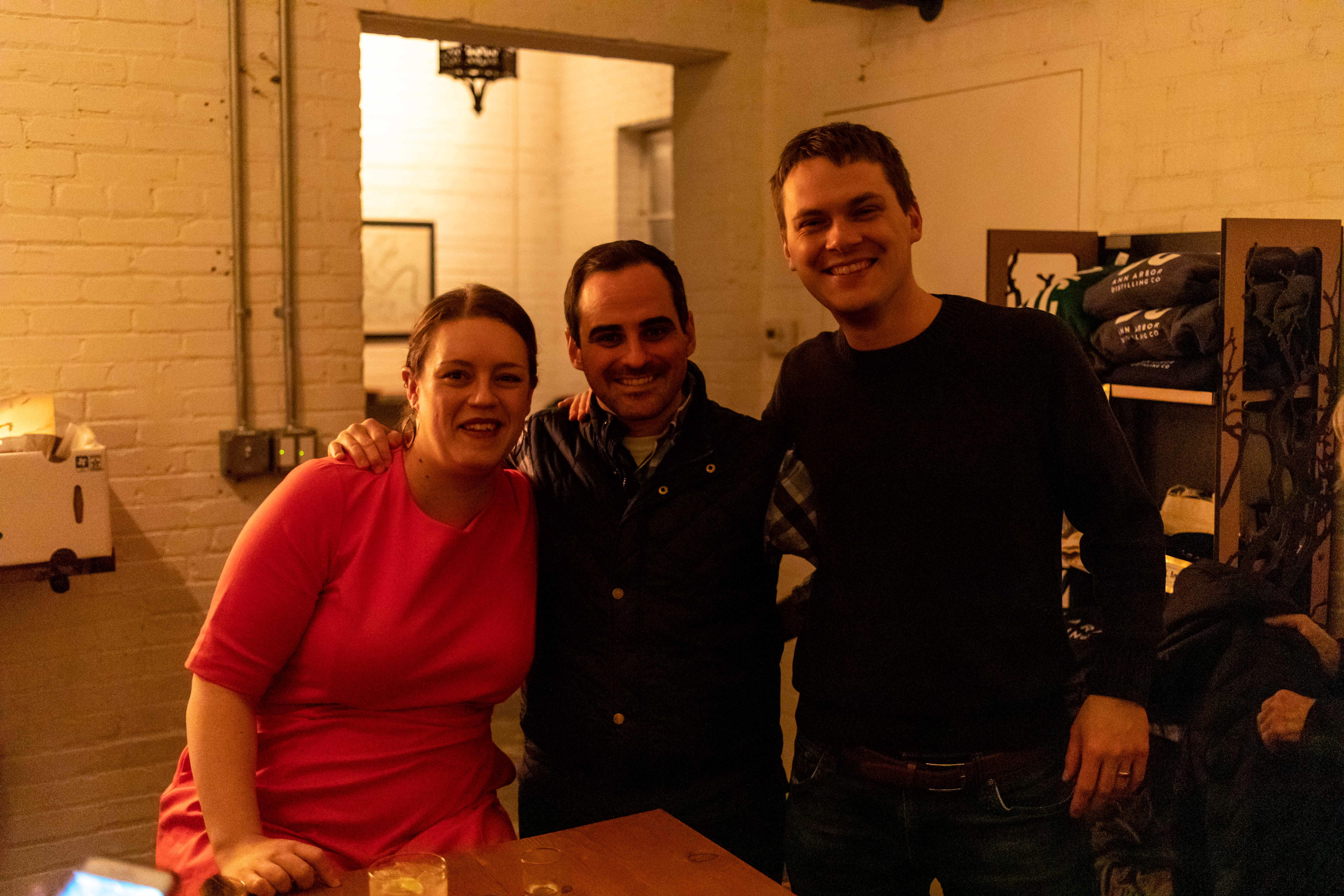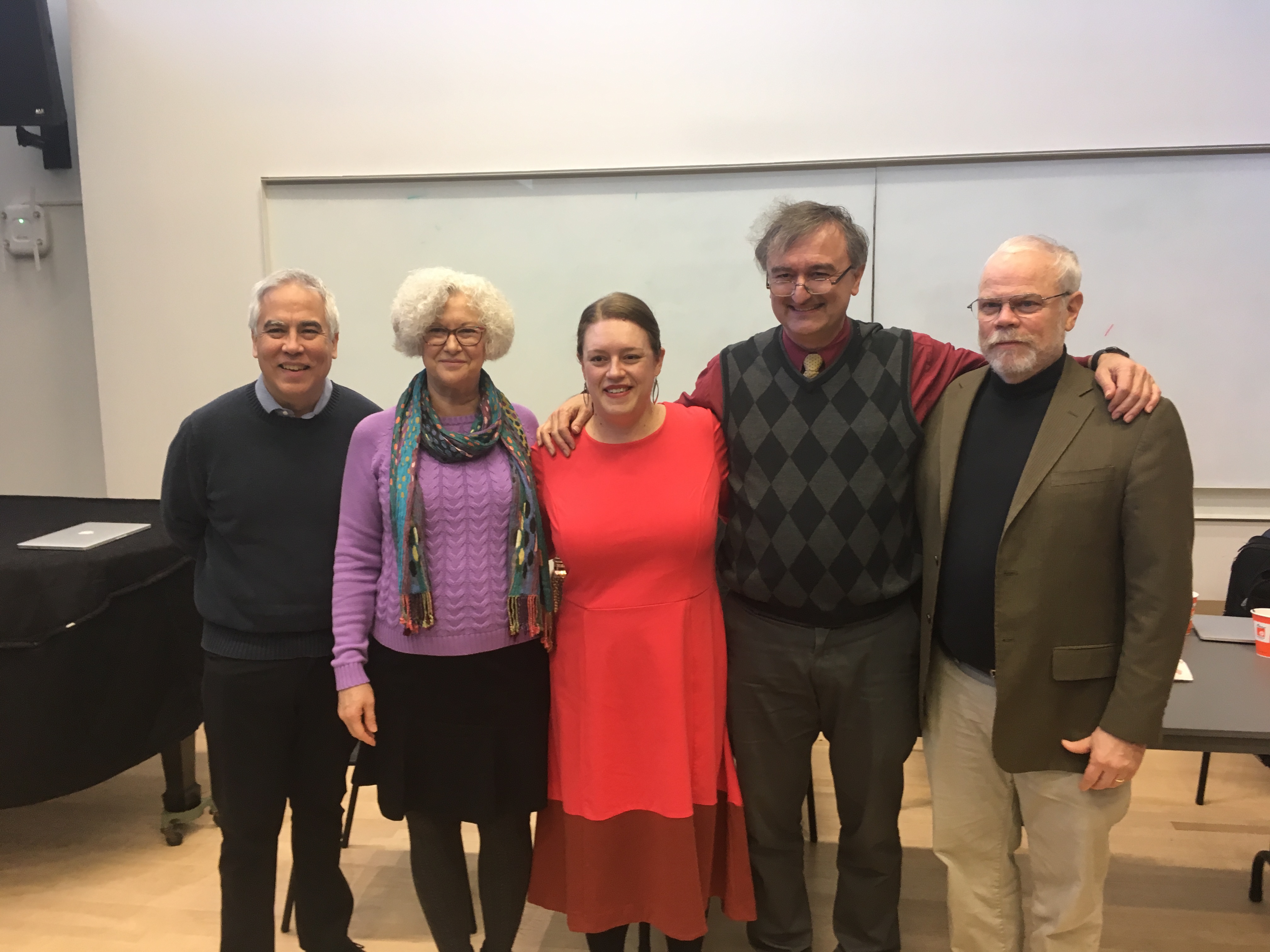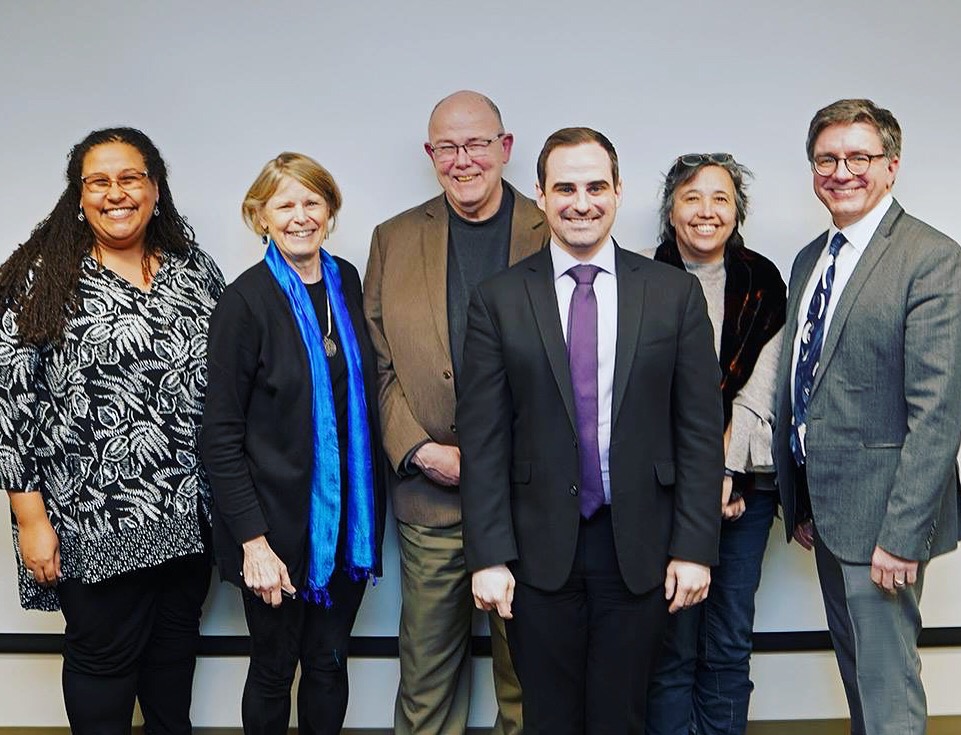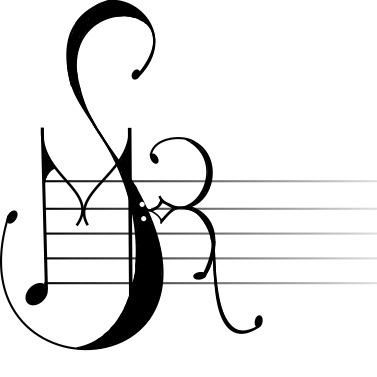
Last Tuesday, SMR members Anne Heminger and Austin Stewart mounted a double-header and successfully—not to mention adeptly and admirably—defended their respective dissertations. Anne's dissertation is titled "Confession Carried Aloft: Music, Religious Identity, and Sacred Space in London, c. 1540–1560" and Austin's is titled "The Opera is Booming. This is a City.: Opera in the Urban Frontier of Denver, 1864–1893" (see abstracts below). Congratulations, both of you!

Anne Heminger (middle) and dissertation committee
Profs. Charles Garrett, Theresa Tinkle, Stefano Mengozzi, James Borders
Abstract:
"Confession Carried Aloft: Music, Religious Identity, and Sacred Space in London, c. 1540–1560"
The gradual unfolding of religious reform movements in Tudor England has generated considerable scholarship intent on evaluating why and how the English Reformations happened as they did. Although musicologists typically consider the reigns of Edward VI (1547–53) and Mary I (1553–8) as distinct “Protestant” and “Catholic” periods, respectively, historians including Christopher Haigh, Susan Brigden, and Diarmaid MacCulloch have shown that religious practices and beliefs remained remarkably heterogeneous even into the reign of James I. This dissertation examines music and religious identity in mid-sixteenth-century London, investigating the cases in which local parishes and individual inhabitants turned to music—in a variety of forms, styles, genres, and contexts—to make sense of the doctrinal and liturgical transformations imposed on them by a rapidly changing succession of monarchs in the two decades from c. 1540–1560. Through a study of archival documents, popular print books and broadsides, contemporary diaries, religious drama, and manuscript and print sources of music—undertaking research into topics and repertoires not usually studied in musicological scholarship—this dissertation not only shows that music played a larger role in the early English Reformations than has been heretofore acknowledged, but also demonstrates that it was the versatility of music as a communicative medium that allowed it to facilitate, reinforce, and reflect religious change in this divided society.
A basic assumption underlying this study is that the transformation of religious life in mid-sixteenth-century London entailed a radical rethinking not only of religious dogma, but also (and more importantly) of the phenomenology of ritual as a sensory experience. Drawing on theories of ritual, space, and place by writers such as Michel de Certeau and Catherine Bell, as well as work in sixteenth-century sensory theory by Matthew Milner, this dissertation highlights how Londoners used music and sound to sacralize formerly Catholic (and then recently Protestant) spaces, corroborating Jonathan Z. Smith’s contention that “ritual is not an expression of or a response to ‘the Sacred’; rather, something or someone is made sacred by ritual.” In sixteenth-century England, the church was omnipresent; people attended mass on Sundays, read from prayer books in their homes, celebrated with their trade guilds at special worship services, and sang religious ballads together. Beginning with the parish church, this dissertation offers evidence that polyphonic music—whether in Latin or English—was foundational rather than incidental to liturgical as well as domestic religious expression. Text-oriented forms of religious music, especially that issued in print for wide circulation, provided an important means for articulating confessional teaching during these years. Both reformers and conservatives also saw the potential of music and sound to render profane places temporarily sacred; those on either side of the confessional divide used public performances including celebratory religious processions and theatrical productions as opportunities to invite religious conversion. By investigating music making across these confessional, performative, and contextual boundaries, this dissertation demonstrates that mid-sixteenth-century Londoners used both new and old music to anchor contemporary practice in the past and mediate between shifting religious orthodoxies, providing a window into what historian Christopher Marsh has called “the view from the pew.”

Austin Stewart (front and center) and dissertation committee
Profs. Naomi André, Katherine Preston (William & Mary), Steven Whiting, Gabriela Cruz, Mark Clague, and Philip Deloria (Harvard, on Skype)
Abstract:
"The Opera is Booming. This is a City.: Opera in the Urban Frontier of Denver, 1864–1893"
In 1888, a Harper’s Weekly correspondent praised Denver, Colorado as “a metropolis, a center of refinement, a place rich in itself, influential, and the admiration of all beholders.” Three decades earlier, Denver was little more than an outpost at the edge of the American frontier; now, Denver was representative of civic respectability and westward progress. This dissertation examines the presence of opera during the emergence of Denver as an economic and political center in the American West, and how opera was experienced between 1864 and 1893 by audiences in spaces from makeshift theaters above saloons to the Tabor Grand Opera House. The first date marks the earliest known performance of opera in Denver; the latter, the onset of the city’s economic depression following the repeal of the Sherman Silver Purchase Act. Whether performed by itinerant professional troupes or local amateurs, opera played an active role in the process of urbanizing the frontier and sustaining Denver’s civic identity. Opera, as the cultural institution of the nineteenth century, also signposted settler colonialism in the American West, as well as opportunities for both dominant and minority groups to construct place and community. Challenging perceptions of culture in the American frontier, “The Opera is Booming. This is a City.: Opera in the Urban Frontier of Denver, 1864–1893” explores not only the performance and reception of opera in Denver, but also its use by civic boosters to direct a fledgling city in political and social matters.</p>
This dissertation navigates the relationship between opera in Denver and place-making, identity, civic boosterism, the exchange of vernacular opera, and participatory music-making. By examining the role of opera in Denver’s public life, discourses about the moralizing influence of theater and “civilizing” the frontier emerge, which reframe new Western history scholarship on “high” culture. Institutions such as the Tabor Grand Opera House (1881) reflected the stability of the city’s economy and growing population, as well as its perceived affluence. The existence of this theater entwined Denver in a nation-wide cultural exchange of English-language opera for the middle class, and inspired local amateur operatics to involve themselves in creating opera. They crafted their collective identity into a Colorado-themed operetta Brittle Silver (1882), a homespun piece that contributed significantly to place-making for Denver’s amateur musicians, inspired an affective attachment to the region, and took as its themes silver mining labor disputes, interactions between miners and tourists, and relations with the indigenous nations. Finally, this dissertation brings to light the same phenomenon of amateur operatic activity in Denver’s African American community; this includes an examination of Harry Lawrence Freeman’s The Martyr (1893) and its performance by his amateur company, engaging representations of emancipation, religiosity, and liberty in the American West. On balance, this dissertation redresses several gaps in Western urban history by considering culture, class, civic and racial identity, and boosterism through the ambitious, often irrational lens of opera production.
(Photos by Andy Dil)
Recent Posts
SMR to Host Midwest Graduate Music Consortium 2025 Conference – January 13, 2025
SMR Welcome BBQ at County Farm Park – October 01, 2024
Julian Grey defends dissertation – June 05, 2024
Michaela Franzen defends dissertation – May 21, 2024
Kai West defends dissertation – May 16, 2024
Micah Mooney and Carlos Pérez Tabares present at Music Theory Midwest – May 12, 2024
SMR end-of-year round-up at County Farm Park – April 25, 2024
SMR hosts Research Showcase – September 29, 2023
 Society for Music Research
Society for Music Research